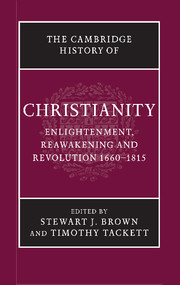Book contents
- Frontmatter
- Introduction
- PART I CHURCH, STATE, AND SOCIETY IN THE EUROPEAN WORLD, 1660–1780
- PART II CHRISTIAN LIFE IN THE EUROPEAN WORLD, 1660–1780
- PART III MOVEMENTS AND CHALLENGES
- 13 Christianity and the rise of science, 1660–1815
- 14 The Enlightenment critique of Christianity
- 15 The Christian Enlightenment
- 16 Jansenism and the international suppression of the Jesuits
- 17 Evangelical awakenings in the North Atlantic world
- 18 Toleration and movements of Christian reunion, 1660–1789
- PART IV CHRISTIAN DEVELOPMENTS IN THE NON-EUROPEAN WORLD
- PART V REVOLUTION AND THE CHRISTIAN WORLD
- Chronology
- Bibliography
- Index
- References
14 - The Enlightenment critique of Christianity
from PART III - MOVEMENTS AND CHALLENGES
Published online by Cambridge University Press: 28 March 2008
- Frontmatter
- Introduction
- PART I CHURCH, STATE, AND SOCIETY IN THE EUROPEAN WORLD, 1660–1780
- PART II CHRISTIAN LIFE IN THE EUROPEAN WORLD, 1660–1780
- PART III MOVEMENTS AND CHALLENGES
- 13 Christianity and the rise of science, 1660–1815
- 14 The Enlightenment critique of Christianity
- 15 The Christian Enlightenment
- 16 Jansenism and the international suppression of the Jesuits
- 17 Evangelical awakenings in the North Atlantic world
- 18 Toleration and movements of Christian reunion, 1660–1789
- PART IV CHRISTIAN DEVELOPMENTS IN THE NON-EUROPEAN WORLD
- PART V REVOLUTION AND THE CHRISTIAN WORLD
- Chronology
- Bibliography
- Index
- References
Summary
The crisis provoked by monarchical absolutism and established churches
The period after 1660 saw the emergence of the first sustained attack on Christianity from within Europe since the triumph of the Christian Church under Constantine in the fourth century. To be sure the critics were few and the dangers great. But once unleashed, they became a radical force, never again to be silenced. A specific set of circumstances caused the anti-Christian genie to spring from a dark and angry place within minds angered by fear and persecution. Some of these circumstances were contingent on political events, but others had to do with the intellectual forces unleashed largely by the new science from Copernicus to Newton. The formal philosophical systems and discoveries of the seventeenth century – and the Baroque age will always be remembered for Galileo, Descartes, Hobbes, and Spinoza – shattered a previous certainty once given to the philosophy of Aristotle as interpreted by the Christian scholastics. In addition, in the 1680s the promotion of absolutist policies in France and Britain threatened the stability of all of northern and western Europe and the religious independence of Protestants in England, Ireland, the Dutch Republic, and potentially in the German states west of the Rhine.
In 1685, Louis XIV revoked the Edict of Nantes and declared Protestantism illegal in France; he also made clear his desire to fortify his kingdom by seizing land belonging to the Low Countries and the independent German states. The land- and slave-owning privileges of Protestants in the French colonies were also severely restricted as were the ‘freedoms’ offered to slaves.
- Type
- Chapter
- Information
- The Cambridge History of Christianity , pp. 265 - 282Publisher: Cambridge University PressPrint publication year: 2006
References
- 3
- Cited by

